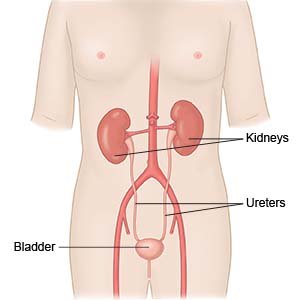Kidney Transplant
Medically reviewed by Drugs.com. Last updated on Aug 4, 2025.
Kidney transplant is surgery to replace a damaged kidney with a new kidney from another person.
 |
WHILE YOU ARE HERE:
Before your surgery:
- Informed consent is a legal document that explains the tests, treatments, or procedures that you may need. Informed consent means you understand what will be done and can make decisions about what you want. You give your permission when you sign the consent form. You can have someone sign this form for you if you are not able to sign it. You have the right to understand your medical care in words you know. Before you sign the consent form, understand the risks and benefits of what will be done. Make sure all your questions are answered.
- An enema may be used to help empty your bowels.
- An IV is a small tube placed in your vein that is used to give you medicine or liquids.
- A central line (a type of IV catheter) may be placed. The central line may be used to give medicines or IV fluids. It may also be hooked up to a monitor to take certain blood pressure readings. This information helps healthcare providers check how well your heart is working.
- General anesthesia will keep you asleep and free from pain during surgery. Anesthesia may be given through your IV. You may instead breathe it in through a mask or a tube placed down your throat. The tube may cause you to have a sore throat when you wake up.
During your surgery:
- Your surgeon will make an incision on your abdomen. He or she will attach your new kidney by stitching the blood vessels of the new kidney to your blood vessels. The ureter of the new kidney will be attached to your bladder. Your damaged kidneys will be left in place unless they are causing problems such as infection or high blood pressure.
- Drains will be put near the kidney to remove blood or fluid from your incisions. Your incisions will be closed with stitches or surgical tape and covered with bandages.
After your surgery:
- You may be taken to a recovery room or an intensive care unit (ICU). Healthcare providers will watch you closely to make sure you are okay. Do not get out of bed until your healthcare provider says it is okay. When healthcare providers see that you are okay, you will be taken back to your hospital room. A healthcare provider may remove the bandages soon after surgery to check your wound or drains. The drains are taken out when the incision stops draining.
- You will be helped to walk around after surgery. Movement will help prevent blood clots. You may also be given exercises to do in bed. Do not get out of bed on your own until your healthcare provider says you can. Talk to healthcare providers before you get up the first time. They may need to help you stand up safely. When you are able to get up on your own, sit or lie down right away if you feel weak or dizzy. Then press the call light button to let healthcare providers know you need help.
- Take deep breaths and cough 10 times each hour. This will decrease your risk for a lung infection. Take a deep breath and hold it for as long as you can. Let the air out and then cough strongly. Deep breaths help open your airway. You may be given an incentive spirometer to help you take deep breaths. Put the plastic piece in your mouth and take a slow, deep breath, then let the air out and cough. Repeat these steps 10 times every hour.
- Medicines may be given to prevent or relieve pain, nausea, or an infection caused by bacteria. You will be given antirejection medicine. This helps prevent your body from rejecting your new kidney. You may need to take this medicine for the rest of your life. Medicine may be given to prevent anemia and help your body make red blood cells. Vitamins and minerals, especially vitamin D, calcium, or iron, may be needed to improve your health.
- Blood and urine tests will be sent to a lab for tests. These tests check how well your new kidney is working.
- Angiogram or ultrasound pictures may be used to check blood flow in your kidneys and urinary tract.
RISKS:
You may bleed more than expected or get an infection. Nerves, blood vessels, muscles, intestines, and other organs may get damaged. You may have problems with your ureter or bladder, which may cause urine to leak. You may develop a life-threatening blood clot in your arm or leg. Your condition may get worse during surgery, and may become life-threatening. Your body may reject the new kidney.
CARE AGREEMENT:
You have the right to help plan your care. Learn about your health condition and how it may be treated. Discuss treatment options with your healthcare providers to decide what care you want to receive. You always have the right to refuse treatment.© Copyright Merative 2025 Information is for End User's use only and may not be sold, redistributed or otherwise used for commercial purposes.
The above information is an educational aid only. It is not intended as medical advice for individual conditions or treatments. Talk to your doctor, nurse or pharmacist before following any medical regimen to see if it is safe and effective for you.
Learn more about Kidney Transplant
Treatment options
Symptoms and treatments
Further information
Always consult your healthcare provider to ensure the information displayed on this page applies to your personal circumstances.
